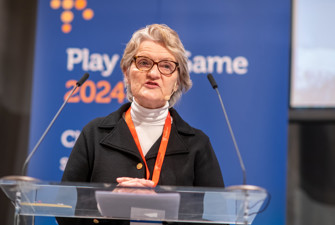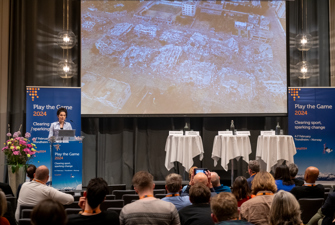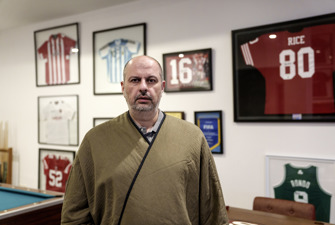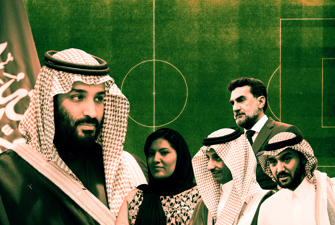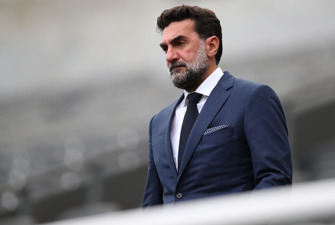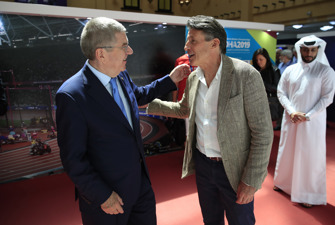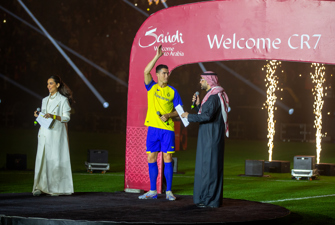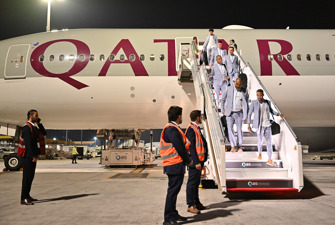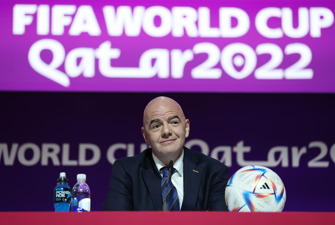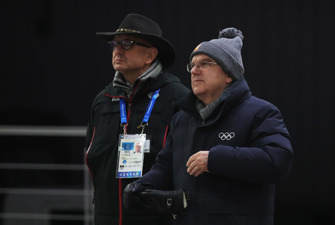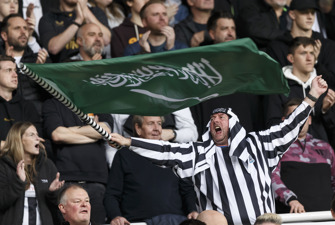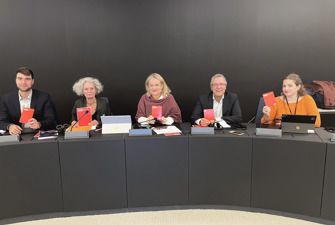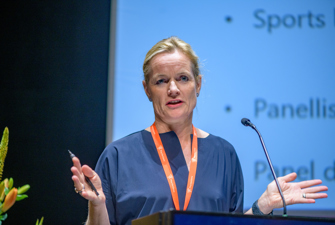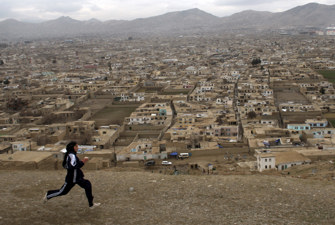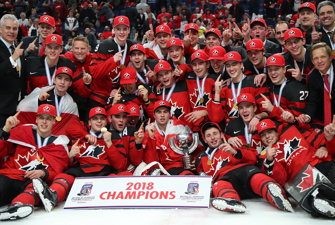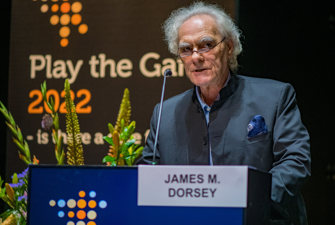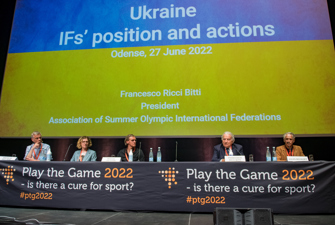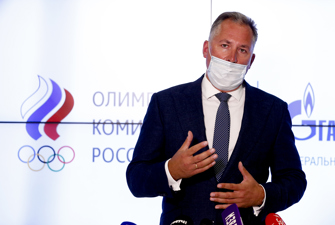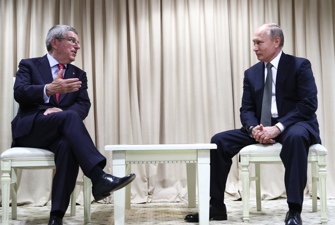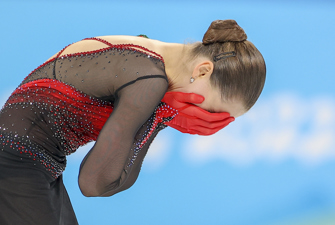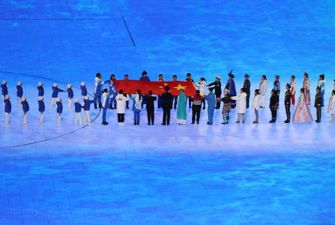The playbook that keeps Thomas Bach in power at the IOC
COMMENT: Today, Thomas Bach has been re-elected as IOC President for a final four year term without any opponents or opposition. Using Bach’s doctoral thesis as a departure point, Jens Weinreich describes how constantly planning for the future has provided Bach with an unprecedented hold on power in the Olympic system.
Comments on playthegame.org reflect the views of the author(s).
The German National Library has two branches. One in Frankfurt am Main, where the German Olympic Sports Confederation (DOSB) and numerous sports associations are based. There is a second branch in Leipzig, the city that applied in vain for the 2012 Summer Olympics - and which was once the intellectual centre of GDR sport, along with its criminal excesses.
Some years ago I went to Leipzig to get closer to the man who was already playing a central role in world Olympic sport back then. The man I had been observing for more than twenty years, whom I researched, and about whom I had reported extensively.
So I ordered Thomas Bach's doctoral thesis from the German National Library.
Then the little book that had interested me for a long time finally lay in front of me. Lime green cover. 211 pages. Signature Di 1983 A 8224. Nobody had asked for it for thirty years. The booklet seemed virgin, untouched. Neither side of this “inaugural dissertation to obtain the dignity of Doctor juris utriusque of the High Law Faculty of the Bavarian Julius Maximilians University of Würzburg” was broken. The author: Thomas Bach, born on December 29, 1953 in Würzburg “as the son of the businessman Andreas Bach and his wife Maria”.
It is a very dry piece of work that Bach dedicated to his “dear wife” Claudia and submitted to Professor Georg Brunner. Oral exam on July 7, 1983. Doctorate on July 22, 1983, seven years after his Olympic victory with the German foil fencers in Montreal. Title of his doctoral thesis: “The Influence of Forecasts on the Jurisprudence of the Federal Constitutional Court”.
But Bach actually dealt with politics. In this dissertation, patterns and storylines shimmer through that have shaped Bach's sport-political work ever since. For 38 years, whether as DOSB president, politician (he was involved in the Liberal party FDP for several years and is still a member), business lobbyist (for corporations such as Adidas, Holzmann, Siemens or MAN Ferrostaal) or as the highest Olympic dignitary on the planet.
“The doctoral thesis was about the interfaces between law and politics,“ Bach told me in Buenos Aires in 2013, shortly before he reached his goal and became President of the International Olympic Committee (IOC).
“It was about the mutual creative leeway. That interested me.”
The need to constantly plan for the future
In his dissertation, Bach dealt with the question of how forecasts can determine the course of things. Whether the case law of the highest German court, the Federal Constitutional Court, or the decisions of politicians - and later on sports politicians. The forecasts have to sound professional. This is how the desired results can be organised. You just have to want it and do it skilfully enough. This is how luck can be forced - and politics.
Bach quoted the French author Bertrand de Jouvenel extensively. “The political decision is an attempt to influence the future state of the world,“ de Jouvenel wrote once. “Such an attempt entails calculating in advance what the effect of the decision will be; one therefore takes into account facts that will arise or coincidences.”
The then 29-year-old Bach wrote: “Political disputes are mostly about the correct assessment of the future. In order to survive this dispute and to meet the demands of modern politics, extensive political foresight is required. The politician has to get an idea of the eventualities and at the same time be prepared for the unexpected. These needs are to be met by constantly creating new plans and political programs and continuously updating them. Planning for the future, however, also requires knowledge of future developments.“
Fascinating: This passage reads like the instructions for his later work.
Like a playbook, to use a current Olympic term.
A very special playbook.
Rationality. Always new plans and political programmes. Constant updating - that is precisely Bach's policy.
- In 2009 he basically prepared his candidacy for the IOC presidency with a speech at the Olympic Congress in Copenhagen.
- In 2013 he published his manifesto for the IOC election campaign on that basis.
- In 2014 he let the IOC session pass his Agenda 2020.
- In 2021, a few days before his re-election, the IOC presented another agenda with the strangely absurd title Agenda 2020+5.
The first point in this latest paper is: “The Olympic Movement: turning challenges into opportunities.”
That can be the motto for the life of the IOC President.
Turning challenges into opportunities
Bach grew up in modest circumstances, his father died early, and his controversial fencing coach Emil Beck assumed a kind of father role.
Bach became successful, won an Olympic gold medal with the German team, received his doctorate, and got his sports-political education under Horst Dassler, the inventor of modern sports corruption, and then IOC president Juan Antonio Samarach, another role model for the Frankonian. At times Bach was fascinated by politics and power, as well as, yes, money. Bach was a hyper-ambitious climber.
“Creative leeways” was one focus of his dissertation. “Turning challenges into opportunities” is what the latest agenda says.
Do you see the connections?
Much of these papers, which are called Agenda something, are dazzling. Some things are propaganda, some parts are new, some things make sense. But Bach could have tackled almost anything many years earlier. If he had wanted to. But in some cases he did the opposite. In many functions, for example, he ensured that the bidding race for the Olympic Games turned into a gigantic monopoly in which the technically best candidate almost never won.
This competition of cities and nations, always held in the odd years between the Olympic Games since the beginning of the 1990s, had to fail at some point.
Now, in dire straits, when one candidate after the other failed in referendums in democratic nations, Bach made the opposite - and his disciples suddenly sold it as a revolution.
Revolution. Evolution. Evolution of the revolution. Unity. Diversity. Unity in diversity. These are Olympic buzzwords that Bach and his propaganda department are flooding the world with.
Or, regarding the Corona Games in Tokyo: There will be an Olympic light at the end of the tunnel.
And actually it is one of Bach's outstanding strengths to find a salvation from seemingly hopeless situations. Turning challenges into opportunities.
None of this is sensational, there are no visions behind it. Thomas Bach is an Olympic pragmatist. In 2017, in dire straits, he only did the obvious, which was unthinkable for a few decades - and awarded the Summer Olympics as a double to Paris (2024) and Los Angeles (2028).
A re-election without pomp and circumstance
Update. Forecast. Influence. Lobbying. To harvest. Take chances. Create scope for creativity in a wide range of life issues. That was what it was all about in 1983, when Bach defended his doctoral thesis; that was what it was all about in 2013 when he became IOC President; this is what the next four years on top of the IOC Group will be about.
The problem, however, is that his point of view, all the assumptions of his propaganda department and the cheering arias of most IOC members have nothing to do with how people in large parts of the world think about Bach and how the media report about the so-called Olympic family. Self-perception, propaganda and perception of others are drifting apart enormously.
The 137th IOC session is taking place from Wednesday 10 March to Friday 12 March 2021 for four hours each via video conference and ticks off 31 items on the agenda at record speed. Only one of them is the Corona Games in Tokyo this summer, which is amazing considering the daunting task. Another point is the re-election of the president - on 10 March.
Everything should have been so beautiful, it was directed. Splendour and glory, full of symbolism, appropriate to the size of the functionary: Congress in Athens, birthplace of the modern Olympic Games, with the obligatory day trip to the Peloponnese, to ancient Olympia. Then the new crowning glory, of course, with no opposing candidates. But now, in the midst of the pandemic, it will again be just a virtual IOC general assembly, with almost no pomp and circumstances.
Those IOC employees who have to count how many heads of state and government Bach has met cannot add to the list this week. That hurts no one more than the German, who obviously believes he is on a par with the most important politicians on the planet, as demonstrated by appearances at the UN General Assembly or at the G20 summit.
Fears that Bach’s rule could be extended
Since Thomas Bach dominated the IOC almost more blatantly than any of his eight predecessors since 1894 – even more so than de Coubertin and Samaranch – there was even speculation that the Olympic Charter could be changed to grant him a third term.
Clever and scandalous term extensions were common practice under his father-figure friend, Juan Antonio Samaranch. In 1999, at the end of an existential corruption crisis year for the IOC, it was decided that presidents could only rule for eight years with a four-year extension.
Such mental games that Bach's followers would apply for the term limit of twelve years to be lifted are an expression of general helplessness in the Olympic industry. The worst is feared.
Because Bach's rule shows totalitarian tendencies.
The influence of simple IOC members is dwindling
While the president and the small number of his most important allies, including the Executive Board, are becoming more and more powerful and decisions are becoming more and more opaque, the influence and competence of simple IOC members is rapidly dwindling.
That was never so clear as in the eighth year of Bach‘s presidency. For example, on the issue of the 2032 Summer Olympics, which have basically already been awarded to Brisbane, Queensland - non-transparent, without competition, without comprehensible criteria.
The topic has made headlines around the world. Bach's compatriots in Germany’s DOSB accuse the IOC of “false statements” and untruths - but they lack the courage and knowledge to directly criticise the person primarily responsible, i.e. Bach. Therefore, such accusations of blame should not be taken seriously.
Incidentally, at the IOC press conference two weeks ago, Bach routinely pointed out that the 2019 IOC session unanimously approved the new procedure. That is exactly the problem in totalitarian systems.
It is exciting to see what lessons the Arab sheikhs draw from the events and the pre-decision for Brisbane 2032. Ironically, those who have covered world sport with a network of corruption feel tremendously duped.
The idea of pan-Arab games, from Gulf Games in Qatar, Saudi Arabia, Kuwait, Bahrain, in the United Arab Emirates to Oman, is being vigorously pursued. The sheikhs will remind Bach who has to dance to whose whistle here. The sport-political consequences of the Brisbane project cannot be foreseen. Perhaps Bach has overacted this time. He has gone too far.
The IOC is basically only represented by Thomas Bach, with huge drawbacks perhaps by his buddy John Coates. The vice president for whom the age limit has been lifted. Who knows what conflicts of interest exist in the numerous incompatible functions in the Olympic business he holds. Coates brought the 2000 Olympic Games to Sydney in September 1993 because he signed additional contracts with two corrupt African members the night before the decision. So-called development aid. Sydney won 45:43 against Beijing.
The role of Coates, also president of the Court of Arbitration for Sport (CAS) and head of the IOC coordination commission for Tokyo, has been discussed worldwide since the dubious preliminary decision for Brisbane. For such conflicts of interest, Thomas Bach, who himself came under criticism several times for controversial consultancy contracts and activities (Adidas, Holzmann, Siemens, Ferrostaal), once invented the phrase “diverse life circumstances”.
Or, again: Turning challenges into opportunities. Various circumstances of life.
A president without an obvious successor
Under Bach, the monopoly IOC secured more than the basic revenues until 2032, with long-term TV contracts and in some cases with sponsorship packages. They also have one billion dollars in the accounts of the Olympic Foundation, the core of the IOC Group. But, money is not the problem.
Tokyo remains an absurdly risky adventure. The Pandemic Games will have to fall back on Bach because it would have been wise to postpone the Summer Games to 2022. And then Beijing comes with the Winter Games early next year.
The working atmosphere at the IOC headquarters in Lausanne is described by employees as a depressing, intimidating climate of fear. They are talking about a “sun king”, a “Louis Quatorze”, a “dictator”. But it is about more fundamental questions than the working atmosphere. Because the IOC makes itself almost superfluous under the sole ruler.
Who else does the world notice from the IOC, except Bach and, of course, those figures who are involved in numerous corruption and criminal cases and make bad headlines around the world?
This is a very important question if you assume that four years from now, after the president’s reign, there should still be a self-determined future for the highest body in world sport.
Who of the current 103 full members (minus the suspected criminals Patrick Hickey and Sheikh Ahmad Al-Fahad Al-Sabah, who suspended themselves years ago) has undisputed competencies combined with unquestionable integrity?
A huge brain drain can be observed in the IOC. Many members are overwhelmed with the technical requirements. It is a result of the president's policy.
55 of the current 103 members were accepted under Bach. Yes, the IOC was getting younger and more feminine, but otherwise? Impetus from outside, which some new members should bring, cannot be recognized. Most recently, for example, the former Croatian President Kolinda Grabar-Kitarović and the Saudi Princess Reema Bandar Al-Saud were co-opted. These are little more than cosmetic measures – window dressing for the IOC.
The democratic deficit in the Olympic movement
Of course, the IOC was never a laboratory for developing basic democratic virtues. But on the contrary. There have never been any noteworthy oppositional currents either.
The policy of speaking with one voice promoted by Bach is having an impact: When was the last time a member refused to follow on important issues? When was the last really open debate at an IOC session? What is expressly not meant are those embarrassing, unmasking addresses of devotion with which Bach accompanied his announcement in July 2020 that he would run for another four years, and which will certainly be continued on the day of his re-election.
It is a personality cult. Simple. Fact.
The decisions are prepared in very small circles and basically already made. The IOC's ethics committee is a disgrace and far from being independent. The ethics secretariat is integrated into the administration together with the compliance officer. The IOC has only recently put pressure on the two corruption-infested Olympic federation – Weightlifting (IWF) and Boxing (AIBA) – and threatened them with exclusion from the Olympics after having been tolerated for decades.
Some of the 35 Olympic federations have better transparency and ethics rules than the IOC. More and more international federations are publishing minutes of their board meetings. The IOC has never done this, the minutes of the Executive Board and other bodies’ meetings are top secret.
Although there are annual financial reports under Bach, decisive details about contracts with TV companies and sponsors or all individual payments to National Olympic Committees remain business secrets.The director general, Christophe De Kepper, acts as Bach's praetorian, fast and brutal, who controls everything and immediately rebukes occasional deviants. The Belgian also represents the IOC interests in international hybrid bodies and numerous good governance structures vis-à-vis political institutions, mercilessly and in a tricky manner.
At IOC sessions under President Bach, opinions that deviated from the prevailing doctrine were very rarely expressed. Rejections undesirable. Opposing votes are even rarer, because they are politically dangerous and career-destroying. The few upright athletes’ representatives who temporarily resisted - Claudia Bokel, Adam Pengilly, Hayley Wickenheiser and Beckie Scott - were attacked, punished and slandered in a variety of ways.
Refusal to reform the bidding process for Winter Games
Another example, a very recent one: The Canadian Richard Pound, the IOC doyen, has suggested after the many failed citizen surveys that the IOC should reform the bidding process for the Winter Olympic Games, suspend it for a while and only then continue with the allocation of the 2022 Winter Games.
Had that happened, the world would not debate Beijing 2022, a boycott and the catastrophic human rights situation in China today and in the coming months: Concentration camps for Uyghurs, environmental sins - and the highly controversial practices of IOC sponsors such as Alibaba, the company that built a gigantic Olympic cloud.
But Bach did not dwell for a minute on Pound's warning. Beijing became the Olympic host after a dubious election in 2015 on which the last word may not have been spoken: the election was canceled due to alleged problems with the electronic voting system - the IOC voted again, this time with slips of paper, and Beijing won against Almaty. Surprisingly close.
So, Beijing 2022 is a homemade problem. Bach cannot shirk his responsibility.
Just as the 2014 Games in Sochi were the biggest Olympic fraud of all time in two ways, doping and corruption.
Both Winter Games, overshadowed by human rights abuses, corruption and the Russian state doping system, remain in the public eye associated with the name Thomas Bach, no matter how hard the IOC's propaganda department struggles and tries to create a different impression. Bach cultivated an extremely close relationship with both rulers, Vladimir Putin and Xi Jinping. Bach awarded Xi Jinping the Olympic Order.
The domestication of Richard Pound
Richard Pound, who is celebrating his 79th birthday in a few days, is one of the few IOC folks who can make up their own mind competently and reasonably independently. However, Bach also domesticated him a while ago. There is a certain tragedy in this.
These days several media all over the world have published a commentary by Pound. The Canadian is praising Bach similar to the prayers of almost 40 IOC members at the 136th session.
This is an important part of IOC’s propaganda policy – they always do that. They want to influence public opinion. IOC’s director and Bach’s speaker Mark Adams has explained how well that works – from their point of view – at several occasions including IOC sessions. They love this kind of propaganda, and Pound is now actively supporting it, and not for the first time.
This PR strategy was introduced in 1999 by Hill & Knowlton, when the IOC was fighting for its existence in the middle of the corruption crisis. It is important to know that strategy when dealing with Pound’s comments.
Pound’s praise follows an old official trick by Bach: Pound was sent to the Future Host Commission for the Games of the Olympiad, headed by the Norwegian Kristin Kloster Aasen. That small commission that was just preparing the scandalous, non-transparent decision for Brisbane.
Always new commissions. Tricks and handpicked members. Imitations of democracy. Personality cult.
The IOC should be ashamed.
Bach has learned sport-politics from Samaranch and Dassler. He even described a lot about his views in his doctoral thesis in 1983. One could have known.



















